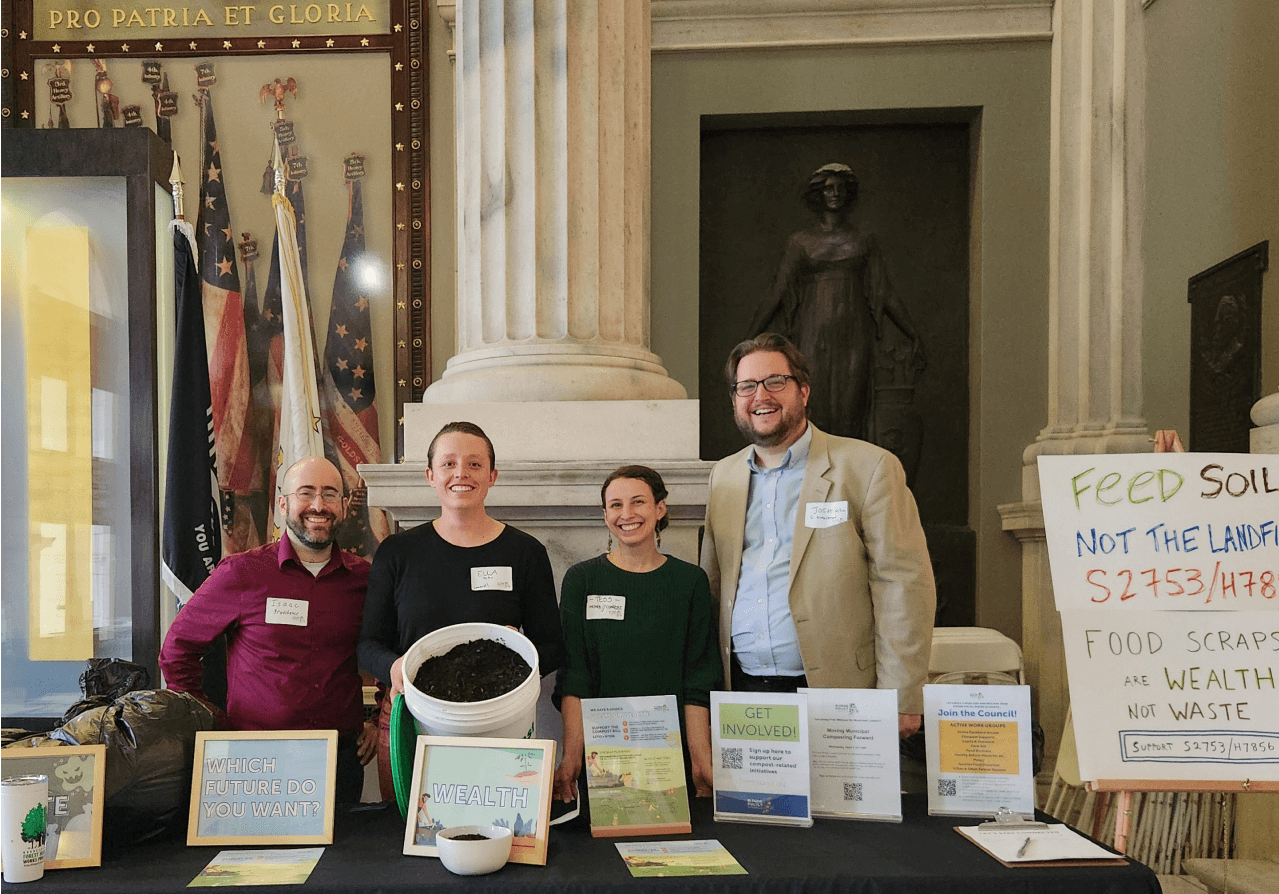2023 ANNUAL IMPACT REPORT
Shifting power for transformative change
RHODE ISLAND FOOD SYSTEM HIGHLIGHTS
$12B
of economic output annually
$5M
paid in tipping fees associated with wasted food annually
$17.5K
per acre for the most expensive farmland in the country
$93M
of seafood is landed annually
142,000
Rhode Islanders receive SNAP benefits
Hispanic and Black Rhode Islanders were much more likely to receive SNAP benefits than White Rhode Islanders, supplementing food purchases for 36.3% of Hispanic households, 28.3% of Black households enrolled, and 10.1% of White households.
137,896
students are provided free or reduced-price school meals annually
LETTER FROM THE NETWORK DIRECTOR
“We have met the enemy and he is us.” — Walt Kelly
“We are the ones we have been waiting for.” — Alice Walker

As we moved through the 365 days of 2023, we faced incredible challenges. These included strong storms, high rates of food insecurity, and high land prices for farmers. We saw many local restaurants and food businesses disappear. We saw hundreds of thousands of pounds of food waste generating greenhouse gasses that were released into our atmosphere.
READ MORE
Big threats to a just and resilient food system call for a powerful response, and the members of the RI Food Policy Council stepped up to come together to achieve a number of hard-won victories. One of the biggest changes we made this year was a change in our own structure. In May 2023, the Council voted to alter its structure to be more aligned with its deep commitment to equity. As opposed to its old structure – and the structures of most food policy councils across the country – RIFPC now welcomes ALL people who want to work together to support our mission to be Council members. As long as you agree to abide by our Meeting Agreements and participate in one of our Work Groups, you are in! Council members carry the power of the network with them when they go into the State House, and our new structure allows this power to be distributed more evenly across our state, laying the groundwork for progress toward justice and resilience.
Throughout this report you will learn more about our victories, meet some of our amazing members, and get a look at our ambitious plans for 2024. In 2023, we:
- Fought for our state’s critical farmland protection programs, leveraging $2.5 million for them in partnership with legislative champions
- Maintained an increase in state support for the Rhode Island Local Agriculture and Seafood Act Grant Program which provides small grants that support our beginning farmers and fishers
- Joined forces with partners like the RI Community Food Bank and the RI Healthy Schools Coalition to advance legislation to bring free healthy school meals to all public school students
- Launched our groundbreaking Food System Metrics Dashboard and refreshed our Municipal Food Systems Factsheets and created a new accompanying Toolkit for municipalities
- Helped scores of farms, fishers, and food businesses to apply for state and Federal funding, which in turn resulted in hundreds of thousands of dollars flowing into this critical economic sector
- Supported the state in updating its food strategy, which, when published next year, will set out a vision and a detailed plan of action for improving the state’s food system by 2030
These victories benefit all Rhode Islanders, and they help make our state a national leader in supporting small and beginning farmers and fishers, cultivating underserved food entrepreneurs, and integrating food systems priorities into long-range climate policy and state plans.
Sometimes we are our own worst enemies. RIFPC is here to make sure that we can be our own local food superheroes as well. Our network has proven time and time again that real change is possible, and in fact inevitable, when we believe in ourselves, stay open to understanding the perspectives of others, and work together toward the common goal of a just and resilient food system. Thank you all for your ongoing support of RIFPC!
Sincerely,

Nessa Richman
WE’RE GROWING FOR CHANGE
Now, anyone with expertise or experience who wants to collaborate on advancing the Council’s priorities and commits to upholding our shared values can participate as a Council member. No applications, screenings, or professional credentials are required.
RIFPC’s Strategic Objectives 2023-2025

Increase food access, security, justice, and sovereignty for marginalized Rhode Islanders by coordinating and advocating for changes that enable all people to eat healthy, nutritious, culturally and religiously appropriate food of their own choice, regardless of zip code.
Support the economic strength and resilience of RI food businesses, especially those that have been historically under-served and/or under-resourced.
Create, contribute to, and advocate for policy that integrates climate, justice, environment, and food recovery in a way that centers social responsibility and economic equity at the municipal, state and Federal levels.
Provide leadership, resources, and direction to state food system planning and policymaking in alignment with RIFPC’s commitment to equity.
Empower the network – current Council, Council alumni, and the broader network – to build community power and affect positive change in alignment with our mission.
THIS YEAR’S HIGHLIGHTS

Supporting and advocating for food producers
Read More

Read More

Read More

Read More
KNOW US BY THE NUMBERS
2023 saw record participation and engagement, and according to our most recent Council survey, the vast majority of our network agrees we’re actively cultivating a sense of community and mutual caring, and are committed to dismantling oppression.
We continue to explore ways to integrate and operationalize that commitment, and further pursue racial and social equity, led largely by our Equity Work Group and a new Communications & Outreach Work Group, who are designing for equitable access, fostering a celebratory culture of diversity, and connecting as individuals through shared values.
NETWORK ENGAGEMENT
272
engaged network members
9
active work groups
326
participants in events
POLICY & ADVOCACY
14
meetings with elected officials and municipal leaders
6
letters of testimony submitted
176
food systems-related bills tracked
EDUCATION & PROGRAMS
10
free advocacy-based learning opportunities
150
hours of direct 1:1 technical assistance for grant applicants
105
participants supported by technical assistance programs
COMMUNICATIONS METRICS
1.1K
website visitors
5,713
social media followers
2,752
newsletter subscribers
EQUITY AROUND THE TABLE
– Adrienne Maree Brown [1]

2023 STEERING COMMITTEE
Steven J. Arthurs
Rachel Averitt
Margaret DeVos
Tess Feigenbaum
Gemma Gorham
Ella Kilpatrick Kotner
Maggie Longo
Amelia Lopez
Diane Lynch
Vernon Martin II
Andrew Morley
Natalie Morris
Jeanette Nessett
Kelsey Rogers
Dana Siles
BOARD OF DIRECTORS
Diane Lynch, President
Steven J. Arthurs
Courtney Bourns
Amber Jackson
Thea Upham
Staff
Nessa Richman,
Executive Director
Josh Daly,
Associate Director
Rachel Newman Greene,
Food Access & Nutrition Security, Program Director
Max De Faria,
Food Access & Nutrition Security Program, Senior Program Associate
Allison Montagnon,
Communications Manager
INTERNS
Joleen Owusu-Sekyere
Madeleine Lee
Olivia Capriotti
FINANCIALS
FY2023: 1/1/2023-12/31/2023
REVENUE
EXPENSES
FUNDING PARTNERS
Our funding partners are critical to our success. We are grateful for their ongoing support, which allows us to leverage innovative, inclusive ideas that create solutions to complex challenges, and foster a healthier, more prosperous food system in Rhode Island, as well as the Northeast region.
Angell Foundation
Center for Mediation and Collaboration (Land & Sea Together)
Henry P. Kendall Foundation
Island Foundation
Point32Health Foundation
Rhode Island Department of Environmental Management
Rhode Island Foundation
Rhode Island Department of Health
University of Vermont, Food Systems Research Center (ASPIRES)
UNFI Foundation
USDA Agricultural Marketing Service
USDA National Institute of Food & Agriculture
USDA Rural Development
Vermont Sustainable Jobs Fund

